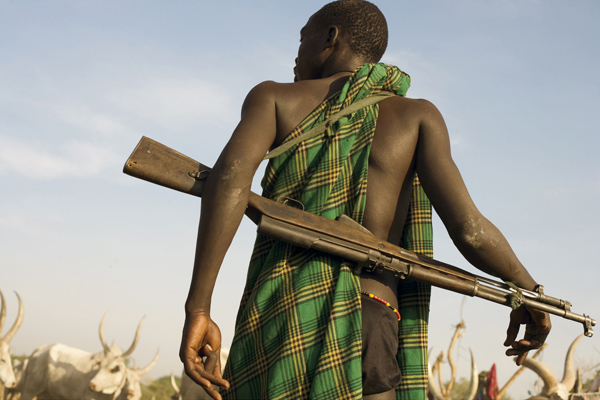
Editor’s Note: Our guest contributor has been doing relief and development work in South Sudan since the mid-1980s. The writer requested anonymity to ensure that the observations and opinions expressed here are not perceived as the view of his employer.
In mid-August news came out from Jonglei state that Murle raiders had attacked Nuer villages, killing 900 people, displacing another 20,000, and stealing 26,000 heads of cattle. Before that, in mid-June, Sudan Tribune had reported a similar attack from the Nuer against the Murle; the newspaper then quoted 600 dead. Back in June, events in these isolated areas did not receive much attention, but in August the U.N. mission decided to intervene. It stationed helicopters in the area for aerial surveillance. But it also sounded out the possibility of peace talks and got from the Murle a straight answer: no peace talks without the presence of Bishop Paride Taban.
[A bit of the backstory on Bishop Taban: In 1983 he became the first bishop of the Catholic diocese of Torit. Under his guidance, the diocese, which covers most of what is now East Equatoria state, became one of the main service providers, especially in education, health, and relief. When he retired in 2004, Bishop Taban founded the Kuron Peace Village in the borderland between Toposa, Murle, Jiee, and Kacipo to promote peaceful co-existance of these groups.]Sudan scholar Douglas Johnson, in his book The root causes of the civil wars in the Sudan, mentions cattle raids and arms from Khartoum in Jonglei. One example Johnson gives is that within months of the Bor mutiny in 1983, which sparked the second civil war, Khartoum began to arm Ishmael Konye who then and now is the leader of the Murle. And from late 1984 Khartoum also armed the Anyanya 2, among them the Bul Nuer under Paulino Matip’s command. Though the arms were used for cattle raiding as much as for fighting the SPLA, Khartoum achieved its aims of fighting the war by proxy and of suggesting to the outside world that there was no war against the central government but rather internal tribal wars among Southerners. The military interests of Khartoum and the interest of traditional cattle raiders fit together well during the whole war and beyond.
Fast forward 30 years to today. Paulino Matip lives in a vast compound behind 10-foot high walls in the center of Juba, and Ishmael Konye too probably spends most of his time now in the capital city. Whatever they are up to now, there are surely people in their home areas who would like to imitate them.
For the Murle to kill hundreds of people and to steal thousands of cattle from the Nuer in August, or for the Nuer to do the same to the Murle in June—these are big military campaigns. These are not just a bunch of hot-headed cattle raiders. Tribal authorities are necessary to mobilize such a large force. And there must be an external supplier of the necessary ammunition who also has the means to get it to this isolated area where the roads are impassable during the rainy season.
Perhaps Khartoum is once again supplying the ammunition. If so, then Khartoum will supply it to one or at most two local figures that it wants to build up. If over the years such a figure becomes too powerful or embarrassing (as may have happened most recently with Joseph Kony of the Lord’s Resistance Army), Khartoum can drop such a figure and start to boost someone else again. This state of affairs will likely continue as long as Khartoum wages war in the border areas and thus fears South Sudan’s involvement.
In these traditional areas there are so many cattle raiders that, given a sufficient supply of ammunition, it is unlikely that U.N. peacekeepers, a police force, or even an SPLA detachment would be able to control the situation, however well trained and equipped they are.
In early September the deputy speaker of the East Equatoria parliament organized a funeral for his 14-year-old daughter who had died a few weeks earlier. To paraphrase the deputy speaker’s remarks:
[A]ll the violence happening on our roads is a shame to us as if we cannot get our house in order now that we are independent. But for those in Jonglei there is even more shame in view of the cattle raiding and killing going on there. Now the Murle have said they cannot talk peace if Bishop Taban is not witnessing it. I am proud to belong to the same church as Taban because he is trusted so much. Let us follow in the footsteps of Taban.
Perhaps this suggests what is possible for the different actors. Just like the deputy speaker said, the political elite should feel it is a shame that Southern Sudanese are set up to oppose each other, especially at this time when people feel united in independence. As Bishop Taban advocates, the cycle of revenge must be interrupted, and some development for the most isolated areas and ethnic groups must be promoted, so that potential cattle raiders can see that wealth does not have to be stolen but can also be created, provided there is peace.
But all of this is, of course, easier said than done.
Photo: A Mundari cattle keeper guards his herd (IRIN)

